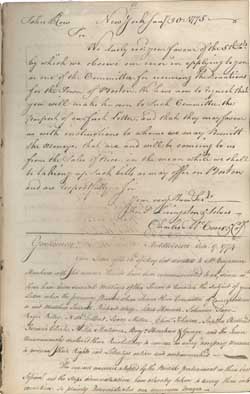Letter from Titus Hosmer of the Committee of Correspondence for Middletown, Connecticut, to the Boston Committee of Donations (copy in letterbook volume 2), 17 October 1774, pages 81-83
To order an image, navigate to the full
display and click "request this image"
on the blue toolbar.
-
Choose an alternate description of this item written for these projects:
- Main description
[ This description is from the project: Coming of the American Revolution ]
In this letter Titus Hosmer from Middletown, Connecticut, pledges his town's support to "furnish you with every Support & Aid
in our power" as an act of resistance against Britains' trade restrictions on Boston and its harbor.
An Abundance of Goodwill
In September and October of 1774, representatives from twelve American colonies gather in Philadelphia for a "Grand Continental Congress." The fifty-six delegates in attendance have a vital mandate: to organize an appropriate response to the Coercive Acts, and to determine the nature of Parliament's authority over the colonies. The Boston Committee of Correspondence does everything possible to keep the plight of the city in colonists' minds. On 17 September, the Congress is reminded of Boston's suffering when the Suffolk Resolves (prepared by Joseph Warren and a committee of men in Boston) are presented to delegates. As a result of these efforts, relief--in the form of food, supplies, and information--pours into Boston from towns and colonies across the continent. The Boston Committee of Donations, which counts Samuel Adams and Joseph Warren as members, keeps a record of each gift and replies to the donors with a gracious note of thanks.
View the Letter from James Warren of the Boston Committee of Donations to the Committee of Correspondence for Middletown, Connecticut.
Questions to Consider
1. What does the letter say that the British Ministry will use "to force a Submission of particular Places and Provinces to weaken and disunite us?"
2. Which town is the first to be challenged and made to "suffer in the Common Cause?"
3. What did the Bill of Lading contain? What is it to be applied toward?
Further Exploration
4. Add Question.

